How long does it take to learn guitar? This is a question we get asked all the time. Let’s dive in!
In this free lesson you will learn
- How long it takes to learn guitar and what you should expect
- 4 common things that slow people down as they learn guitar
- 3 tips for learning faster (and having more fun!)
Over 250,000 guitar-learners get our world-class guitar tips & tutorials sent straight to their inbox: Click here to join them
How long does it take to learn guitar?
You’ve probably seen a cool guitar solo on YouTube or want to start picking up a hobby on the side, and thought you would venture into this musical world.
- Now that your interest is piqued to learn how to play, you might be wondering “how long does it take to learn guitar?”/li>
- While we’d love to tell you that in just a few short weeks you can go from zero to Jimi Hendrix, that’s not the case.
- But don’t be discouraged. Guitar playing is much more about deliberate practice than it is about pure talent.
Every person progresses at a different rate, and has differing amounts of time they can dedicate to their craft, so keep that in mind.
With all our years of teaching, we have found that there is a general timeline for what you can expect when it comes to progressing.
Keep in mind, this is a timeline for practising a total of 1-2 hours a week. If you practice more, you can expect faster results and if it’s less you can stretch out this timeline.
The key to success for our students is making practice fun. Pick songs and types of music you actually enjoy playing.
GAME-CHANGING TIP: Only practice songs you love. (This make a big difference.)
When you enjoy what you’re learning, you practice more. You look forward to practice. You’re excited about practicing!
That will keep you going through the hard times when you need to do certain sections over and over again to get them right.
How long does it take to learn guitar: Your first 1 to 3 months
Now that we’ve discussed the importance of goal setting, tips to finding your starter guitar, and what to keep in mind when you start learning the guitar, we’ll break down what you should keep in mind when it comes to a timeline of progression.
Focus your first 3 months on basic open chords such as Em, A, Am, E, Dsus2, Cmaj7 and G.
You’ll progress faster with the use of our stepping stone chords.
Stepping stone chords give guitar learners the ability to start learning chords fast. This will give you a boost of confidence as you quickly work your way through a lot of chords and enjoy a sense of progression.
- One thing you need to know as a beginner is that for the most part, there are a variety of ways to play different chords. There are easier and harder ways, both of which you should try to learn.
- During your first three months you’ll also be getting a feel for rhythm and strumming. If you have never played music before on any kind of instrument or even playing with something electronic such as Guitar Hero, this might be a learning curve for you.
However, if you have basic rhythm or have a tempo-keeper, such as a metronome, then this will just be a matter of refinement.
It’s not easy to strum and hit the right strings every time, but with enough practice throughout these first three months you’ll be able to get this down.
Learn 12 EASY beginner chords with our popular guide

✅ Stop struggling. Start making music.
✅ Learn beginner-friendly versions of every chord.
This is our most popular guide and it will improve your chord ability quickly! 😎
Get your own personalised guitar-learning plan 🎸
Get a custom guitar-learning plan here: Click here for GuitarMetrics™
World-Class Guitar Courses 🌎
Learn from the world's best guitar educators: Click here for our guitar courses
How long does it take to learn guitar: Your first 3 to 6 months
The three to six month period is where people who truly want to learn the guitar will get weeded out from people who just thought it looked like something cool but aren’t fully committed.
In the beginning, it’s easy to be excited and think you’re going to learn in a matter of weeks. By this point, you realize your strengths and limitations. The finger calluses have set in and you are starting to get a good idea of the basics.
This is where you should progress to be able to play more open chords like C, D, and E.
These chords are used in a lot of songs and will give you the ability to span beyond the handful of songs and chords you know.
How long does it take to learn guitar: Your first 6 to 18 months
After six months, you should start to feel comfortable and know your way around a guitar. You might not be busting out amazing solos quite yet, but you’ve mastered the basic chords and you feel comfortable playing.
Maybe at this point you’ve even dared to pull out your guitar and play in front of people.
- You should have the chords already mentioned pretty much nailed down along with the more complex open chords such as F, Dm, Bb.
- This is a great time to begin exploring scales and lead guitar. They complement your chord work perfectly.
If you feel like you’re ready to explore these, take a look at some of our articles on these topics:
How long does it take to learn guitar: Your first 2+ years
After two years you should be tackling barre chords. This is the biggest challenge a guitar learner faces, but the reward on the other side is huge. The whole fretboard opens up to you!
You’ll be able to learn new songs with ease, create your own if you desire, and play any chord.
An exciting possibility…
It’s possible to learn all of these things within 6 months, depending on how much time you want to dedicate to practicing throughout your week.
Once you’ve been playing for years, it’s similar to learning how to ride a bike; You’ll be able to pick it up again even if you quit for a long time.
- How long does it take to learn guitar: How to speed everything up and learn faster
- While we covered the most essential parts to success, picking the right guitar and setting goals, there are some tips and tricks that could make the process even faster.
- The biggest tip for fast progress is to make sure you’re practicing ‘little and often’.
Just like studying for a big test, it’s best to do it early and often as opposed to trying to cram it all in during one extended day.
This also keeps it light and fun when you practice. The last thing you want is for your guitar playing to feel like a nagging chore. NO! That’s not what this is about. This is about doing something you love, connecting with music, connecting with your spiritual side and expressing yourself.
You should view your guitar learning as a fun and lifelong journey. Not a chore. And not something to rush.
Tune up every time, even if you don’t think the guitar needs it
If you tune it before you play, every time, you guarantee the guitar will sound it’s best.
Why does this matter?
- Well, in the early days you won’t have a developed musical ear and often won’t be able to tell when the guitar is slightly out of tune.
- So what happens is, slowly and in creeping increments, the guitar gets far out of tune and you sound awful when you play. Which is deflating.
Tune up, every time!
How long does it take to learn guitar? Picking the right guitar can make a BIG difference.
Walk into any guitar store and you’re likely to see a ton of guitars staring back at you. While you might think it’s good to start with the more expensive ones, that might not be the best choice for you.
Not all guitars are built the same!
We put together a guide to help you narrow down the right starting guitar for your skills and goals – Best Beginner Guitar
Your local music store will have guitar experts on hand to help you find the right guitar for your size, hand shape, playability, and type of music you want to learn.
While some guitars look fancy, picking one that is a better fit will make your learning experience much easier.
There are many types of guitar, but we always recommend a steel-stringed acoustic guitar as a beginner guitar.
There are quite a few reasons why it’s the best one to start with, however, if you’re determined to only learn electric guitar, well, we can’t stop you. You can learn on ANY guitar, but it’s easiest on a steel-stringed acoustic guitar with extra light gauge strings
- But you can learn on any guitar, so if you’ve been given a gift or a hand-me-down from a friend or relative and it might not be a perfect fit, you can still learn.
- No matter what type of guitar you choose, having it easily accessible will be one of the major keys to quickly learning guitar.
- Determination and committed practice will beat someone with the fanciest guitar on the planet who never practices!
- If you keep it stored away or hidden from view, there are barriers to practising which will only hurt your chances of success. Having it out and easy to grab will make it easier when you have some free time to play it, even just a few minutes.
Pro tip: Keep you guitar OUT of its case and somewhere you can see it and pick it up easily. (You will play much more if you do this.)
Know your goals
Why do you want to learn guitar? There is no wrong answer here, but knowing what you are aiming for will help you measure your progress.
Having measurable goals will help you track and see how far you’ve come on your journey. It’s a similar idea to if you were walking somewhere but had no destination in mind. You wouldn’t know if you were any closer to your destination and would quickly lose steam.
Some potential goals include:
- Learning all basic open chords.
- Being able to write your own music.
- Playing in a band one day.
- Being able to play ‘Famous Song X’ in front of your friends
With all goal setting, the more specific you can get into your reason why you want to learn guitar, the easier it will be to track your progress.
Select your guitar goals carefully. Just do one thing.
- Don’t add a lot of challenging chords, scales, or progressions in a short period of time. That’s a recipe for discouragement.
- Setting guitar goals that challenge you but are attainable is the key to success when it comes to learning guitar.
Don’t be afraid to change your guitar goals as you learn. If you only want to learn some popular songs at first and then decide you want to start writing your own songs, that’s great! Your musical journey is long and has lots of fun twists and turns.
Once you set your guitar goals, be sure to work backwards from that step to the smallest, easiest step. For example, most songs follow a similar format: intro, verse, pre-chorus, chorus, verse, pre-chorus, chorus, bridge, verse, chorus, and outro.
Knowing this, you could break it down by section and learn one at a time.
This would change your goal from learning the whole song at once to learning a section at a time. E.g ‘This week I will master the verse of ‘Song X’”.
This helps keep momentum going and gives you the ability to know where you are on your journey.
How to get better at playing guitar
We have a ton of beginner guides and exercises along with videos and PDF’s to download and practice with.
Keep challenging yourself. While it might be fun to just learn a handful of songs and move on, your skills will improve every time you stretch your limits.
Looking for some easy places to start? Check out these guides:
- 14 Easy Guitar Chords For Beginners
- How To Learn Guitar: An 11-Step Programme For Beginners
- 10 Easy Songs On Guitar
- How To Strum A Guitar
- What’s The Best Beginner Guitar?
- Guitar Notes Explained: A Guide For Beginners
What Type of Guitarist Are You?
Take our 60-second quiz & get your results: Take The Quiz
Join the world's best online guitar school 🌎
- Get your own personalised guitar learning plan (customised just for YOU).
- World-class online guitar courses. Learn at your own pace.
- Community Campus & Learning Forum - A friendly community! Connect with our team & students. 😊
- Beginner Song library with chordsheets, tabs and tips. (Songs suitable for all levels!)
- Regular live streams, seminars and Q&A sessions - Learn from world-class guitar educators. Get all your questions answered!
Click here to learn more about National Guitar Academy membership 
Cool Guitar T-shirts 😎
Look cooler! Check out our merch: Click here to see our merch store
Want free guitar tips and video lessons delivered to your inbox?
Join over 250,000 other guitar learners and subscribe to our guitar-tips-by-email service. (It's free.)
We'll send you a series of lessons that will move you to the next level of your guitar journey.
Learn how everything fits together quickly, easily and effectively. We share ninja tips (for instant fun!) but also timeless fundamentals that will deepen your understanding.

Popular Lessons
How To Learn Guitar: An 11-Step Programme For Beginners
How To Choose The Perfect Beginner Guitar
More Cool Guitar Stuff
Learn about National Guitar Academy: About Us
Visit our YouTube channel for fun guitar videos.
Join us on Facebook for daily guitar tips.
Listen to our Learn Guitar Podcast for rapid guitar progress.
Check out our free chord lessons.
Get our best guitar tips & videos
Where should we send it?
Get our best guitar tips & videos















